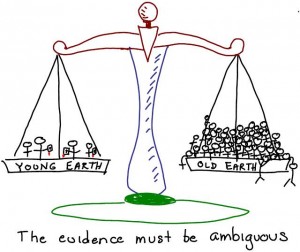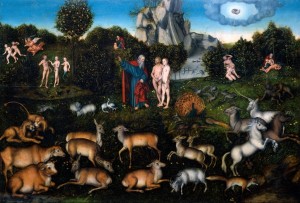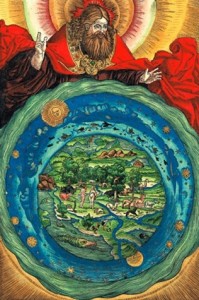I’ve been reading a book Peril in Paradise by Mark S. Whorton. In this book Dr. Whorton, a rocket scientist (Ph. D. in aerospace engineering, worked for NASA) and a Christian, puts forth a case for an old earth and digs into problems with a young earth scenario. Throughout the book he tells a little of his own story. Raised in a Southern Baptist church, son of a deacon, he cut his teeth on “the great doctrines of biblical inspiration and inerrancy.” As a doctoral student he found that his arguments for a young earth fell flat. “My colleagues graciously showed me the flaws in my “scientific evidence.” Essentially my arguments were either based on obsolete data, an incomplete understanding of the processes, or mere speculation. Even more surprising was the overwhelming wealth of evidence for an old earth that I was unaware of.” (p. 214) The data is overwhelming and growing. I have been reading a series of posts on a grand canyon buried beneath the Nile river over at Naturalis Historia. One more thread of evidence consistent with an old earth, but essentially impossible to reconcile with a very young earth. The abundant evidence for an ancient earth caused Whorton to dig more deeply into both the biblical and theological arguments for young earth creationism. He does not espouse an evolutionary creation, leaning instead toward a old earth progressive creation model. According to the back of the book, he has been active in the formation of local chapters of Reasons to Believe founded by Hugh Ross.
In the opening sections of this book Whorton contrasts a “perfect paradise” paradigm with a “perfect plan” paradigm for understanding creation and God as Creator. Many young earth creationists (YEC) base at least part of their argument for a young earth on the phrase in Genesis 1 “God saw all that he had made, and it was very good. And there was evening, and there was morning—the sixth day.” Certainly, death, decay and suffering could not have been part of this “very good” creation. This reasoning leads to the “perfect paradise” paradigm. The garden of Eden was a perfect paradise, ruined only by the sin of Adam and Eve. Anything else would not have been “very good.” To support his argument Whorton quotes some prominent YEC sources. While all who hold to a young earth may not take this particular view, many do.
Perfect Paradise. Whorton lists five basic tenets to the young earth creation paradigm. (p. 25-26)
- When God declared His finished creation “very good” He meant that it was perfect in every conceivable way.
- Eden was the embodiment of the Creator’s ideal intent for His creation.
- Man’s sin thwarted God’s plan, shattered His ideal intent, and ruined all of His perfect creation.
- God introduced the physical death of man and animals as a punishment for sin.
- God instituted the plan of redemption to reverse the effect of Adam’s sin and restore all things back to their original intent.
Most of us have heard some variation of this scenario in church at one time or another. If it is not emphasized, it is still in the background.
Perfect Plan. Rather than a perfect paradise, God created the world in accord with his perfect plan. This plan was not to put humans in a garden for an eternity of fellowship. The plan encompasses the entire cosmos and includes angels, fallen angels, and Satan as well as humans. In Whorton’s view this plan focuses on the glory of God.”The ultimate end for which this world was created is to glorify the Sovereign Creator.” (p. 26) God’s perfect plan will culminate in the age to come.
Seeing the infinite wisdom and matchless perfection of God’s plan, His redeemed creatures will fully – and freely – serve and glorify Him forever. God Himself will dwell with us, and we with Him. All of history unfolds according to the Master’s plan for bringing creation to accomplish His eternal purpose of bringing glory to Himself. (p. 27)
We need to have the humility to recognize that God’s ways and thoughts are higher than ours. “We can only know about God through the things he chooses to reveal to us.”(p. 29) This really means that questioning “the way things are” reflects a lack of proper humility. “When God does not act in a way that appeals to our way of thinking we must allow God to act in ways that are befitting a transcendent Creator with an eternal plan.” (p. 28) The book of Job provides important insight into our proper posture before God.
One of the most important strengths of the Perfect Plan paradigm is that it starts with the view that God’s perfect plan has an unchanging eternal purpose for creation. This plan includes a redeemer from before the beginning. “An indisputable biblical truth is that when God plans or acts, no one – neither Satan nor Adam – can reverse it.” (p. 40)
Why did His plan require that He patiently endure unrecompensed evil for a time? Was it because His plan had been thwarted and He was waiting for Plan B to take effect? No, God’s original, perfect plan called for this patient forbearance of evil in order to accomplish His intent. The cross was not merely a means to recover what was lost in the garden. The cross was chosen before time began as the means to accomplish His eternal purpose. (p. 41)
There is no greater demonstration of God’s plan involving suffering and death as s a means to the end of His purpose than the life and death of Immanuel, God with us. (p. 42)
This emphasis on an unchanging eternal plan is significant. There is no plan B. The presence of a tempter, portrayed as the serpent in the garden, is part of the plan. We have a part to play in God’s plan, but the ultimate success of the plan doesn’t depend on us. “Moreover, if God’s plan was thwarted [or even detoured] at the fall of man, how could there be any assurance that His new plan would not also fail?“
From eternity past, His purpose had always been to bring Himself glory. Having completed His work of creation, He surveyed all He had done and declared it to be “very good.” Now the stage was perfectly set for the unfolding of His perfect plan. (p. 44)
We will need to dig more deeply into the purpose of creation as “for God’s glory.” I am not sure how Whorton understands this, but I have some thoughts. It isn’t a desire for compelled worship … this could have been accomplished by creating worshipers without the need for redemption. It must involve both the essence of God as love and the importance of personal relationship.
We will dig more deeply into Whorton’s discussion of God’s eternal plan in the next post.
How do you read the story? Are we on a round about path back to the garden or following a linear path established before the beginning of time?
Is the best reading a perfect paradise we recover or a perfect plan we follow?
If you wish to contact me directly you may do so at rjs4mail[at]att.net.
If interested you can subscribe to a full text feed of my posts at Musings on Science and Theology.








